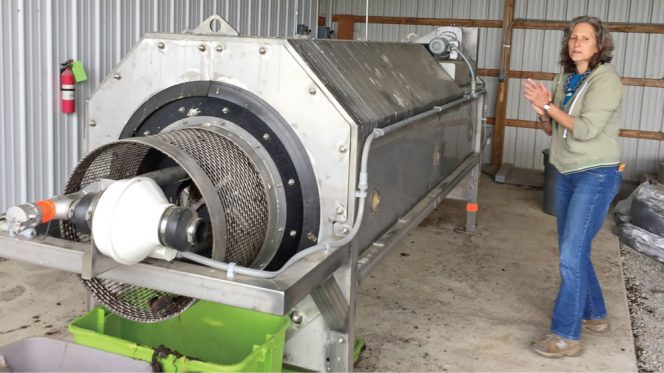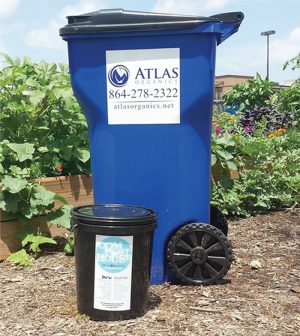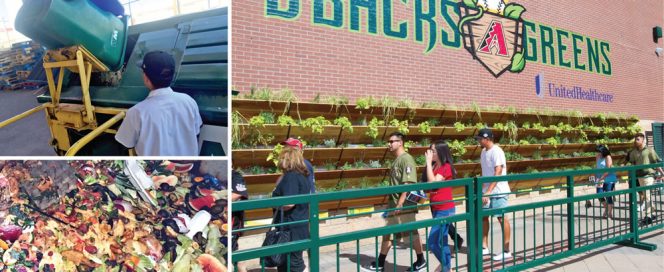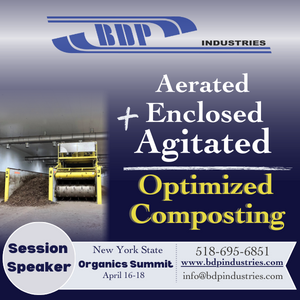BioCycle September 2017

Fulton Farm’s (at Wilson College) prototype composter. Photo courtesy Fulton Center for Sustainability Studies
Chambersburg, Pennsylvania: Campus Food Waste Composting
Fulton Farm at Wilson College is finding new ways to reduce food waste with a prototype composter. This spring, the farm began testing an in-vessel unit, manufactured by DTEnvironmental Inc., with capacity to process 300 gallons/day. The unit will enable the farm to make compost more quickly than the static compost pile/windrow method previously used, according to Chris Mayer, director of Wilson’s Fulton Center for Sustainability Studies. Wilson has been composting food waste from their campus dining hall for more than 10 years. In 2015, the Fulton Center expanded the farm’s composting operation when it entered into an agreement with Volvo Construction Equipment in Shippensburg, Pennsylvania to compost the Volvo facility’s kitchen waste.
During the first six months of operation, the composter processed nearly 4,000 of the 8,871 pounds of food waste composted by the farm. The balance was processed through the static pile/windrow method, Mayer notes. In addition to providing compost for the campus farm, the machine offers students studying chemistry and microbiology opportunities for research.
Atlanta, Georgia: Increasing Community Composting
The Food Well Alliance in Atlanta, formed more than 2 years ago to “connect people and build community through food,” released a white paper prepared by a community-based Compost Working Table facilitated by the Alliance. “Closing The Loop: Food Waste In Atlanta,” identifies 78 challenges and 62 opportunities for increasing community-based composting in Metro Atlanta. The Working Table, comprised of 26 leaders from diverse organizations who recognize that efficient food residual recovery and management promotes healthy soil which leads to healthy food, provided nine strategic recommendations to increase community-based composting in Metro Atlanta. The recommendations include:
• Increase awareness among millennials on the importance of healthy soil.
• Establish a “hub and spoke” system to increase compost production.
• Encourage community agriculture stakeholders to collaborate on identifying funding sources.
• Encourage the Atlanta Community-based Composting Council and Georgia Restaurant Association to leverage technology and implement training to reduce feedstock contamination.
• Provide annual community-based compost operator training.
• Develop a statewide soil strategy.

Atlas Organics’ Compost House program uses 5-gallon collection pails with a compostable liner.
Photo courtesy Atlas Organics
Chattanooga, Tennessee: Doorstep Organics Collection
In August, Atlas Organics launched its Compost House program, which offers doorstep collection of organics. Participants receive two 5-gallon collection pails with a compostable liner to fill with food scraps, including meat and dairy, at the monthly rate of $24. Compost House collects the pails weekly from participants’ homes and returns 10 gallons of finished compost each month. Another option is Atlas’ drop-off site collection program ($14/month). Households receive one 5-gallon collection bucket. When filled, they take it to one of the company’s drop-off locations where organics are collected and composted. Participants receive 10 gallons of finished compost monthly delivered to the drop-off site of their choice upon request.
Kingman, Arizona: Biosolids Composting Saves City $145,000/Year
The City of Kingman has two wastewater treatment plants, with a combined capacity of 1.8 million gallons per day. In 2016, the plants produced 2,214 dry tons of biosolids, which are dewatered and composted in turned windrows in a field north of one of the plants. Tree trimmings from local contractors are mixed with the biosolids as a carbon source and bulking agent.
A portion of the finished compost is used by the City’s parks department on 100 acres of municipal parks and a 90-acre golf course, saving the department over $70,000 in avoided fertilizer and irrigation costs, according to the Daily Miner. Additional savings of $75,000/year come from avoided landfill tipping fees of $34/ton by composting instead of disposing the biosolids.
Phoenix, Arizona: Diamondbacks Sprout Vertical Garden
The Arizona Diamondbacks, a Major League Baseball team, installed a vertical urban garden that is using compost produced from its fledgling organics diversion program.
Funded by UnitedHealthcare and designed by Flower Street Urban Gardens, the garden’s 180 square feet of vertically hanging planting space just outside the main ballpark gates contains up to 200 assorted herbs, including basil, chives, lavender, oregano and rosemary. Diamondbacks’ concessionaire Levy Restaurants collaborated with the team to choose herbs that can be integrated into its menus. Excess produce is donated to local organizations, such as St. Vincent de Paul.
Soil amendments for the garden are produced in part from the preconsumer food waste that the Diamondbacks began diverting this season. Over the first 48 home games, the club and its hauler Waste Management have diverted more than 18 tons to GRO-WELL, a Phoenix area composting facility. Based on the year-to-date tonnage, Rossini expects 35 tons will be diverted before the end of the season. “Our primary focus has been on back-of-house kitchen and prep areas to ensure a clean stream of organic materials,” he says. “With success in the more controlled locations, we’ve expanded collection to [kitchens and prep areas in] select concessions stands and subcontractors and will continue to grow as quickly as possible.”
The Diamondbacks and Levy Restaurants have donated over 6 tons of unused concessions’ food to Phoenix’s Church on the Street so far this season, which equates to approximately 10,000 individual meals to those in need.
New Orleans, Louisiana: Food Scraps Collection Expands
Compost NOW (New Orleans Waste) has partnered with the New Orleans Public Library system and Schmelly’s Dirt Farm, a Greater New Orleans organics collection and composting service, to host free, weekly residential food waste collection programs at different library sites. Residents drop off their frozen food scraps, which are composted at local farms. A total of five libraries are involved in the drop-off program. Over 8 tons of food waste have been collected since the beginning of the year, when Compost NOW started at just two library sites. According to director Lynne Serpe: “We expect to collect at least 3,000 to 4,000 pounds per week of food scraps this fall with our expanded number of sites.”
Fruit and vegetable scraps (including peels and pits), eggshells, nut shells, tea bags, coffee grounds and filters, plain pasta, bread and grains are accepted. Residents are asked to bring their food waste in a paper or compostable bag or a reusable container. No meat, dairy, bones and oily foods are accepted. Schmelly’s Dirt Farm also offers commercial and residential food scraps collection. For the residential collection service, a minimum of five households within a collection area, preferably one city block, is required.
Tehran, Iran: Compost From Rice Waste
Each year, up to 5 million tons of rice bran and straw are produced in Iran, most of which is burned. The practice is among the biggest environmental problems related to agricultural waste disposal in Iran. The Agricultural Biotechnology Research Institute of Iran (ABRII) has developed a system using effective microorganisms (EM) that accelerates the composting process and results in a higher quality finished product, according to Gholamreza Salehi Jozani with ABRII. The technology has been transferred to Isfahan Municipality to implement. “The fertilizer meets national and international standards and is free of any infection for humans and plants and any unpleasant smell,” Salehi told the Financial Tribune.











